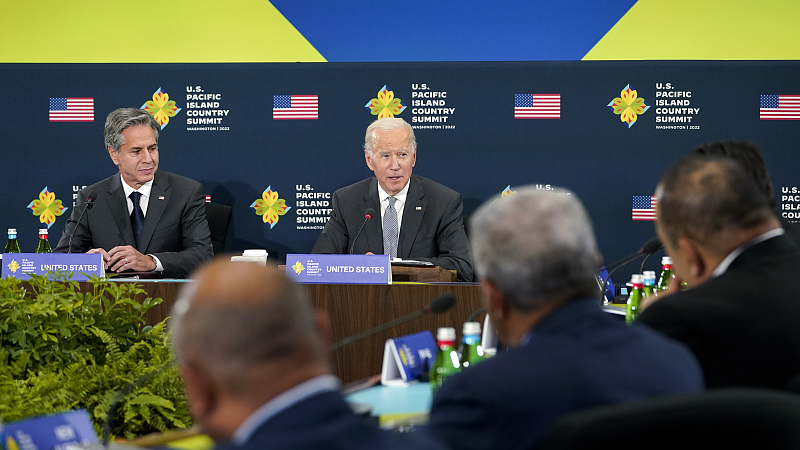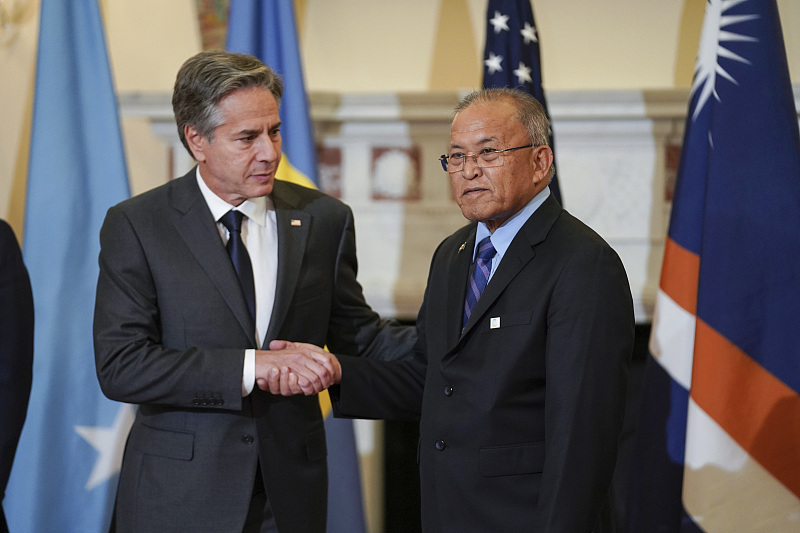
The U.S. President Joe Biden speaks during the first U.S. Pacific Island Country Summit at the State Department in Washington, the U.S., September 29, 2022. /CFP
The U.S. President Joe Biden speaks during the first U.S. Pacific Island Country Summit at the State Department in Washington, the U.S., September 29, 2022. /CFP
Editor's note: Hamzah Rifaat Hussain, a former visiting fellow at the Stimson Center in Washington and former assistant researcher at the Islamabad Policy Research Institute, is a TV anchor at Indus News in Pakistan. The article reflects the author's opinions and not necessarily those of CGTN.
The U.S. President Joe Biden released America's "Pacific Islands Strategy" on the second day of the U.S. Pacific Island Country Summit. The strategy is a grand example, of America promoting camp politics in the Pacific and seeking to leverage the region for its geopolitical objectives. The details of the strategy can be aptly described as both divisive and disruptive.
While purportedly geared at enhancing ties with the Pacific states in a multitude of areas from climate change to infrastructural development, the strategy is actually reflective of a polarizing mindset which seeks to push Pacific Islands towards camp politics. A closer examination demonstrates that the actual objective is to promote divisions amongst member states in the Asia Pacific given its disproportionate focus on geopolitical rivalry.
The truth is that the entire strategy is flawed from the outset. It says that the Pacific Island states face heightened geopolitical tensions and "increasingly those impacts include pressure and economic coercion by the People's Republic of China, which risks undermining the peace, prosperity, and security of the region, and by extension, of the United States."
Essentially, the Biden administration is seeking to impose America's concocted threat perceptions onto the Pacific Islands and mold sovereign foreign policies accordingly. This constitutes a classic example of neo-colonialism where pledges to combat climate change is laced with an attempt to undermine state sovereignty. This also comes despite the fact that China has claimed that its ties with Pacific Island states is anchored in mutual trust, apolitical cooperation and the absence of geopolitics or Cold War agendas. There is simply no appetite for militarization in the region.

The U.S. Secretary of State Antony Blinken shakes hands with Marshall Islands President David Kabua at the State Department in Washington, the U.S., September 29, 2022. /CFP
The U.S. Secretary of State Antony Blinken shakes hands with Marshall Islands President David Kabua at the State Department in Washington, the U.S., September 29, 2022. /CFP
Secondly, while Biden pledged assistance on climate change, maritime security and building health infrastructure in the Pacific, the administration also spoke about the prospect of Pacific Island states boosting communications with Japan, Australia and India. Again, boosting cooperation with other states is the sovereign prerogative of both Pacific Island states and the countries mentioned. In actuality, the Biden administration is promoting an "us vs them" binary or a "Quad vs China" binary in the Pacific Islands which is evidence of a crass Cold War agenda.
Note that there is evidence where as per a White House fact sheet, the U.S. agreed to provide FBI training worth $2.8 million to Pacific Islands which includes the Solomon Islands to undercut China's bilateral relationships. This is laced with purported aims to address the Pacific Island's health and environmental concerns.
That too, has glaring contradictions. Note further that a commitment to addressing the Marshall Islands' environmental and health concerns is a direct contradiction to American history where between 1946 and 1958, 67 U.S. nuclear tests were conducted throughout the islands. The U.S.'s State Department officials also deliberately objected to explicit talks on the Marshall Islands nuclear issue while negotiating the summit declaration which has seen severe resistance from states. In spite of this, the declaration claims that the U.S. acknowledges the nuclear legacy of the Cold War.
The reality is that the legacy of the Cold War continues to live on as per the strategy document which specifically mentions that the U.S. would increase its diplomatic and defense presence including collaborating with states on upgrading submarine cables. Indo-Pacific analyst at the RAND Corporation Derek Grossman, clearly stated that the American objective of expanding ties with the Pacific island states is to prevent China from establishing a military footprint in the region. This reckless, hegemonic behavior which undermines the sovereignty of Pacific Island states is a direct contradiction to a strategy document which states that Washington would strive to ensure that Pacific governments and people have the "autonomy and security to advance their own interests."
The truth is that autonomy, security and state sovereignty will be eroded through such Cold War like strategies which are tabled under the garb of providing economic assistance to the Pacific Islands. The Biden administration has once again demonstrated a narrow, parochial view to engagement with states which do not subscribe to camp politics or militarization.
(If you want to contribute and have specific expertise, please contact us at opinions@cgtn.com. Follow @thouse_opinions on Twitter to discover the latest commentaries in the CGTN Opinion Section.)